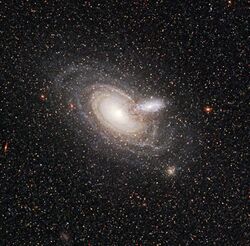Astronomy:2MASX J00482185−2507365 occulting pair
| 2MASX J00482185-2507365 | |
|---|---|
 The pair as photographed by the Hubble Space Telescope | |
| Observation data (J2000 epoch) | |
| Constellation | Sculptor |
| Right ascension | 00h 48m 21.859s[1] |
| Declination | −25° 07′ 36.53″[1] |
| Redshift | 0.064011[2] |
| Helio radial velocity | 19,190 km/s[2] |
| Apparent magnitude (V) | 16.5[2] |
| Characteristics | |
| Apparent size (V) | 0.447′ × 0.286′[3] |
| Other designations | |
| 2MASX J00482185–2507365, PGC 198197, 6dFGS gJ004821.8–250737,[2] Gaia DR2 2345533837084149888 | |
The 2MASX J00482185−2507365 occulting pair is a pair of overlapping spiral galaxies found in the vicinity of NGC 253, the Sculptor Galaxy. Both galaxies are more distant than NGC 253, with the background galaxy, 2MASX J00482185−2507365 (PGC 198197), lying at redshift z=0.06, about 800 million light-years from Earth, and the foreground galaxy lying between NGC 253 and the background galaxy (0.0008 < z < 0.06).[4]
This pair of galaxies illuminates the distribution of galactic dust beyond the visible arms of a spiral galaxy. The heretofore unexpected extent of dust beyond the starry limits of the arms shows new areas for extragalactic astronomical study. The dusty arms extend six times the radii of the starry arms of the galaxy, and are shown silhouetted in HST images against the central and core sections of the background galaxy.[5]
See also
References
- ↑ 1.0 1.1 Skrutskie, Michael F.; Cutri, Roc M.; Stiening, Rae; Weinberg, Martin D.; Schneider, Stephen E.; Carpenter, John M.; Beichman, Charles A.; Capps, Richard W. et al. (1 February 2006). "The Two Micron All Sky Survey (2MASS)". The Astronomical Journal 131 (2): 1163–1183. doi:10.1086/498708. ISSN 0004-6256. Bibcode: 2006AJ....131.1163S.
- ↑ 2.0 2.1 2.2 2.3 "NED results for object PGC 198197". National Aeronautics and Space Administration / Infrared Processing and Analysis Center. http://nedwww.ipac.caltech.edu/cgi-bin/nph-objsearch?objname=PGC+198197&extend=no&out_csys=Equatorial&out_equinox=J2000.0&obj_sort=RA+or+Longitude&of=pre_text&zv_breaker=30000.0&list_limit=5&img_stamp=YES. Retrieved 13 December 2016.
- ↑ "2MASX J00482185–2507365". SIMBAD. Centre de données astronomiques de Strasbourg. http://simbad.u-strasbg.fr/simbad/sim-basic?Ident=2MASX+J00482185%E2%80%932507365.
- ↑ Holwerda, B. W.; Keel, W. C.; Williams, B.; Dalcanton, J. J.; De Jong, R. S. (2009). "An Extended Dust Disk in a Spiral Galaxy: An Occulting Galaxy Pair in the ACS Nearby Galaxy Survey Treasury". The Astronomical Journal 137 (2): 3000–3008. doi:10.1088/0004-6256/137/2/3000. Bibcode: 2009AJ....137.3000H.
- ↑ Daniel Pendick (January 2009). "Galaxy's Dark Secret Exposed". Astronomy 37 (1): 20.
- "Hubble Spies Galaxy Silhouettes". Science Daily. 25 September 2008. https://www.sciencedaily.com/releases/2008/09/080919075530.htm.
- "Galaxy silhouettes: The Hubble Space Telescope discovers overlapping galaxies". Astronomy.com. 17 September 2008. http://www.astronomy.com/asy/default.aspx?c=a&id=7396.
- "Hubble Space Telescope Image: Galaxy Silhouettes". SpaceRef.com. 16 September 2008. http://www.spaceref.com/news/viewpr.html?pid=26446.
External links
- NASA Galaxy Silhouettes[|permanent dead link|dead link}}]
- NASA Hubblesite
- NASA Hubble Heritage Project
- SpaceSpin.org Galaxy Silhouettes
 |

